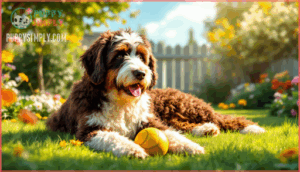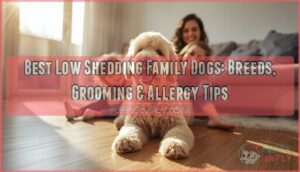This site is supported by our readers. We may earn a commission, at no cost to you, if you purchase through links.

Doodle dogs—crossbreeds mixing Poodles with other purebreds—have exploded from a niche experiment in the 1980s to a billion-dollar phenomenon. These clever, low-shedding companions come in flavors ranging from Labradoodles to Bernedoodles, each promising the best of both parent breeds.
But before you fall for those irresistible curls, you’ll want to understand what makes these designer dogs tick, which breed fits your life, and what you’re actually signing up for.
Table Of Contents
- Key Takeaways
- What Are Doodle Dogs?
- Popular Doodle Dog Breeds
- Doodle Dog Characteristics
- Health, Grooming, and Care Needs
- Adopting and Owning a Doodle Dog
- Frequently Asked Questions (FAQs)
- What are the most expensive doodle breeds?
- What colors and coat types do doodles come in?
- Do doodles do well in small homes or apartments?
- Are doodles good with other pets like cats?
- How much does a doodle puppy typically cost?
- Can doodle dogs live in small apartments comfortably?
- Are doodle dogs good with young children?
- What training methods work best for doodles?
- Do doodle dogs bark excessively or frequently?
- Conclusion
Key Takeaways
- Doodles exploded from a 1980s breeding experiment into a billion-dollar industry by 2025, but shelter surrenders spiked 33% since 2018—revealing a gap between trendy hype and the reality of responsible ownership.
- No doodle is truly hypoallergenic since all dogs produce the Can f 1 allergen protein, though curly-coated, low-shedding varieties do release fewer allergens into your home with proper grooming and bathing routines.
- Size, coat type, and temperament vary wildly across doodle breeds depending on which Poodle parent (Standard, Miniature, or Toy) was used, making it critical to match breed traits to your actual lifestyle instead of wishful thinking.
- Responsible breeder selection requires health testing documentation (hip, eye, genetic screens), transparent contracts with health guarantees, and accreditation from groups like GANA—skip anyone promising "teacup" sizes or guaranteed hypoallergenic coats.
What Are Doodle Dogs?
If you’ve heard the buzz about doodle dogs but aren’t quite sure what makes them different from other pups, you’re in the right place. These crossbreeds combine a Poodle with another purebred dog, creating a mix that’s captured hearts across the country.
Let’s break down where they come from, what makes them tick, and why they’ve become such a hot commodity in the pet world.
Definition and Origins
Doodle dogs—those fluffy, impossibly cute pups with quirky names—are what you get when a Poodle falls for another purebred, creating a crossbreed that’s equal parts charm and genetic lottery.
The doodle origins trace back to the 1980s, when breeders mixed Poodles with other breeds hoping to capture hybrid vigor—stronger health from diverse genetic makeup.
These designer breeds exploded in popularity because people wanted the Poodle’s smarts and low-shedding coat combined with another breed’s personality.
Poodle Parent Types (Standard, Miniature, Toy)
The size of your future doodle depends entirely on which Poodle—Standard, Miniature, or Toy—shows up in the family tree.
Here’s what each Poodle size brings to the mix:
- Standard Poodles (45-70 lbs) create larger doodle dog breeds with athletic builds and more standard grooming needs
- Miniature traits (10-15 lbs) yield medium-sized hybrids perfect for apartments, inheriting toy genetics without going tiny
- Toy Poodles (under 6 lbs) produce pocket-sized companions with hypoallergenic dogs’ low-shedding coats
- Poodle size directly affects hybrid health, temperament, and doodle dog characteristics across generations
Designer Dog Trend and Popularity
Imagine this: back in the late ’80s, one Labradoodle kicked off what’s now a cutthroat billion-dollar industry. Fast-forward to 2025, and the "Doodle Economy" tops $1 billion—fueled by social media virality, celebrity influence, and market trends that have Gen Z choosing hybrid dogs over purebreds 60% more often. But here’s the catch: shelters saw a 33% spike in surrendered poodle mixes since 2018, raising serious questions about breeding ethics behind these designer dogs. To examine the implications of this trend, it’s vital to examine the role of security measures in protecting consumer data.
| Factor | Impact on Popularity | 2025 Data Point |
|---|---|---|
| Social Media | TikTok hashtags hit 1.7B views | 40% annual engagement growth |
| Celebrity Ownership | Goldendoodle accessory sales surged | +28% in 2024 alone |
| Economic Impact | Premium pricing for crossbreeds | $2,000–$5,000 average puppy cost |
| Gen Z Preference | Younger buyers favor doodle dog breeds | 60% more likely than older generations |
| Shelter Trends | Designer dogs flood rescues | 50%+ of adoptable dogs are mixes |
Popular Doodle Dog Breeds
The doodle world is bigger than you might think. Each breed brings its own flavor—some are laid-back cuddle bugs, while others could power a small city with their energy.
Let’s look at the most popular mixes you’ll find wagging their way into hearts everywhere.
Labradoodle
If you’ve ever wanted a dog that combines a Labrador’s boundless energy with a Poodle’s smarts, the Labradoodle might just be your perfect match. This Poodle mix brings serious intelligence levels and loyalty to family dynamics, plus low-shedding coats that won’t leave your furniture covered in fur.
Labradoodle training usually is straightforward thanks to hybrid vigor and their eager-to-please nature, but socialization tips matter—these intelligent and loyal dogs need consistent interaction to thrive.
Goldendoodle
Goldendoodles have earned their spot as one of the most sought-after doodle breeds, and it’s easy to see why—these Golden Retriever-Poodle mixes blend a warm, gentle temperament with that signature low-shedding coat. Their family friendliness makes them ideal companions for households with kids or other pets.
What makes Goldendoodles stand out:
- Easy Goldendoodle training thanks to their intelligent, eager-to-please nature
- Low-shedding coats that need regular grooming tips and maintenance
- Gentle temperament perfect for therapy work or active families
- Health testing from reputable breeders reduces inherited issues
- Flexible nutrition needs that adapt to their size and activity level
Bernedoodle
Bernedoodles bring the Bernese Mountain Dog’s gentle giant charm to the doodle world, wrapped in a fluffy, tri-colored coat that turns heads on every walk.
Their family friendliness and gentle nature make them excellent with kids, though their giant size means they need space to sprawl.
Bernedoodle training works best with positive reinforcement—these low-shedding coats require consistent grooming to prevent matting.
Aussiedoodle
Aussiedoodles pack Australian Shepherd smarts and Poodle athleticism into one high-energy package that thrives on challenges and adventure.
Aussiedoodle training demands consistency because this Aussie mix won’t settle for boring routines—they need mental stimulation daily:
- High energy levels require 60+ minutes of exercise
- Doodle intelligence makes puzzle toys essential
- Low-shedding coats need brushing 3-4 times weekly
- Family pets who bond deeply with active households
Their work-dog heritage means they’ll herd kids if not properly trained.
Other Notable Doodle Mixes
Beyond the big names, doodle hybrids keep expanding—Cockapoos (averaging 13–24 pounds with 12–15 year lifespans), Schnoodles (10–75 pounds depending on size), Boxerdoodles (12–70 pounds), Irish Doodles (40–70 pounds), and Maltipoos (5–20 pounds)—each bring crossbreed benefits worth exploring. These breed variations deliver dog intelligence and help with pet allergies, though coat types differ wildly. Many owners are drawn to these breeds due to their low shedding traits.
| Breed | Weight Range | Lifespan |
|---|---|---|
| Cockapoo | 13–24 lbs | 12–15 years |
| Schnoodle | 10–75 lbs | 10–15 years |
| Maltipoo | 5–20 lbs | 12–16 years |
You’ll find smaller Cockapoos adapt brilliantly to apartments, while Standard Schnoodles match active families perfectly.
Doodle Dog Characteristics
Doodle dogs aren’t one-size-fits-all—they come in a wild range of shapes, sizes, and personalities. What you get depends on which breeds mixed to create your pup, and honestly, it’s a bit of a genetic lottery.
Let’s break down what you can expect regarding size, coat, temperament, and those famous hypoallergenic claims.
Size and Weight Variations
If you think Doodles come in one tidy package, you’re in for a surprise—these dogs range from pocket-sized cuddle bugs to gentle giants that’ll take up half your couch. Weight factors depend heavily on which Poodle parent they inherit from.
MiniDoodle dog breeds might weigh just 10-25 pounds, while bigDoodle dog breeds can hit 70-100 pounds. Growth patterns vary wildly, so predicting your pup’s final size isn’t always straightforward—especially with mixed breed scaling and body proportions at play.
Coat Types and Colors
Doodle coats are like a box of chocolates—you never know exactly what you’re going to get, and that’s part of the adventure. You’ll find Curly Coats that lean hypoallergenic, Wavy Coats with moderate shedding, or straight fur that sheds more. Texture Variations depend on Color Genetics and parent breeds.
Low-Shedding Coats need consistent Grooming Tips—daily brushing prevents mats and keeps your Doodle Dog Coat Types looking sharp.
Temperament and Personality Traits
Your Doodle’s personality is shaped by what both parents bring to the mix—and sometimes those traits surprise you in the best (or most energetic) ways. Personality Types range from outgoing Goldendoodles to driven Aussiedoodles.
Trainability Levels stay high across Doodle Dog Breeds thanks to Intelligent Dogs in the gene pool. Emotional Intelligence and Social Behavior make them Loyal Companions, though Behavioral Issues like hyperactivity can pop up without proper training.
Hypoallergenic Qualities
Many families chase "hypoallergenic" labels, but here’s the reality: no dog is truly allergen-free. About 70% of allergic reactions come from the Can f 1 protein in dander, saliva, and urine—all dogs produce it.
No dog is truly hypoallergenic—all produce the Can f 1 allergen protein that triggers 70% of reactions, even in doodles
That said, curly-coated doodles with low-shedding coats do release fewer allergens into your home. Coat genetics, weekly bathing, and dander management help reduce symptoms, though individual reactions vary wildly across breeds.
Health, Grooming, and Care Needs
Owning a doodle means committing to their unique care routine—these pups need more than just love and kibble. From inherited health risks to coat maintenance that can make or break your schedule, you’ll want to know what you’re signing up for.
Let’s break down the health issues, grooming demands, exercise needs, and nutrition basics that keep your doodle thriving.
Common Health Concerns
Ownership comes with some hard truths about doodle dog health. These mixed breeds can inherit genetic vulnerabilities from both parent lines, so knowing the risks helps you stay ahead of trouble. Here’s what pops up most often:
- Hip Dysplasia affects over 21% of doodles, causing joint pain and mobility issues that may require surgery or lifelong management.
- Eye Problems like progressive retinal atrophy and cataracts impact nearly 18% of adult doodles, potentially leading to blindness without regular screening.
- Allergy Issues plague about 25% of doodles, triggering chronic itching, skin irritation, and ear infections from environmental or food triggers.
- Heart Conditions such as subvalvular aortic stenosis show up in Goldendoodles more than their poodle parents, causing exercise intolerance and sudden cardiac events.
- Digestive Disorders including life-threatening bloat strike up to 10% of large doodle varieties, demanding immediate emergency care.
Regular vet visits and health screenings catch breed-specific traits early, giving you the best shot at managing canine health and wellness challenges before they spiral.
Grooming Requirements by Coat Type
That fluffy coat won’t maintain itself, and the type of fur your doodle inherited dictates how much elbow grease you’ll need to put in.
Curly coat care demands daily brushing and professional grooming every six to eight weeks to prevent matting. Wavy hair grooming needs brushing three times weekly, while straight coats are the easiest—just weekly sessions keep shedding control manageable and mats at bay.
Exercise and Activity Levels
Most doodles don’t just want a walk around the block—they need real movement to burn off that boundless energy they inherit from both sides of the family tree.
Active breeds like Aussiedoodles and Labradoodles thrive with exercise routines that include:
- Daily walks of 30–60 minutes to satisfy their energy levels
- Outdoor activities like fetch, hiking, or swimming for mental stimulation
- Playtime needs that mix physical challenges with brain games
Without enough activity, these energetic breeds get bored and destructive fast.
Nutrition and Veterinary Care
Feeding your doodle the right food and keeping up with vet visits isn’t just good pet parenting—it’s how you avoid expensive emergencies down the road. Choose high-quality kibble that matches your dog’s size and dietary needs, balancing nutrient balance with any health supplements your vet recommends. Regular veterinary care catches issues early, and pet insurance can offset those veterinary costs before they drain your wallet.
| Nutrition Priority | Why It Matters |
|---|---|
| Nutrient Balance | Maintains canine health and prevents deficiencies |
| Quality Protein | Fuels energy in active dog breeds |
| Vet-Approved Diet | Meets specific dietary needs and genetics |
| Regular Check-Ups | Early detection saves money and heartache |
| Health Supplements | Aids joints and immunity as dogs age |
Adopting and Owning a Doodle Dog
So you’re ready to bring a doodle dog into your life—but should you adopt or buy, and how do you even start?
The path to doodle ownership isn’t one-size-fits-all, and making the right choice upfront can save you headaches down the road. Here’s what you need to know before you commit.
Adoption Vs. Buying From Breeders
When you’re ready to bring a Doodle into your life, you’ll hit a fork in the road: rescue adoption or a breeder purchase. Both paths have merit—here’s what to weigh:
- Rescue Options often feature adult Doodles needing homes, letting you skip puppyhood chaos.
- Adoption Process costs less upfront than breeders, but factor in Pet Insurance and Ownership Costs either way.
- Finding Reputable Dog Breeders means avoiding Puppy Mills that prioritize profit over Breeder Ethics.
- Responsible Pet Ownership starts before you even bring your dog home—research matters.
Responsible Breeder Selection
Picking the right breeder isn’t a gamble—it’s a checklist. You want Breeder Accreditation from groups like GANA or Doodle Co-Op, which enforce strict Health Testing and Breeding Ethics. Reputable breeders provide hip, eye, and genetic screening results upfront, retire females after four to six litters, and let you meet the parent dogs. Contract review matters too: look for health guarantees covering hereditary conditions and clear return policies. Responsible breeding means transparency, not hype—skip anyone promising "teacup" sizes or guaranteeing hypoallergenic coats. Puppy socialization starts with the breeder, so ask about early interaction and exposure. Dog breeding and ethics go hand in hand when you’re investing in responsible pet ownership.
| What to Check | Red Flags to Avoid |
|---|---|
| OFA/PennHIP hip testing, CAER eye exams | No health records available |
| Meet at least one parent dog | Parents hidden or unavailable |
| Written health guarantee (1+ year) | Vague or missing contracts |
| Membership in GANA or similar | Overbreeding, excessive litters |
Preparing for Doodle Dog Ownership
Before your doodle comes home, you need more than excitement—you need a game plan that covers everything from crate training to emergency vet contacts. Cost Considerations include food, grooming, and vet bills. Home Preparation means:
- Puppy-proof spaces by removing hazards
- Buy essentials: bowls, leash, collar, ID tags
- Set up Training Strategies for consistency
- Assess Family Dynamics and household routines
- Research Pet Care and Health for FamilyFriendly Dog Breeds
Lifestyle Assessment guarantees your Doodle Dog Breeds match your energy. Dog Ownership and Responsibility starts before day one.
Matching Breed Traits to Your Lifestyle
Your lifestyle isn’t one-size-fits-all, and neither is your doodle—so let’s figure out which breed actually fits the way you live, not the way you wish you lived. Consider your Activity Levels, Living Situation, and Family Needs before choosing from Doodle Dog Breeds.
Here’s a quick Lifestyle Assessment:
| Your Life | Best Match | Why It Works |
|---|---|---|
| Apartment dweller | Cavapoo, Mini Goldendoodle | Smaller Breed Specific Traits suit tight spaces |
| Active outdoors type | Aussiedoodle, Labradoodle | Active and Energetic Breeds need daily adventure |
| First-time owner | Goldendoodle, Cavapoo | Dog Breeds for Beginners are forgiving and enthusiastic |
| Family with kids | Goldendoodle, Bernedoodle | Family Friendly Dog Breeds balance patience with play |
Match Personal Preferences to reality.
Frequently Asked Questions (FAQs)
What are the most expensive doodle breeds?
Luxury breeds like Bernedoodles and Aussiedoodles can cost a pretty penny—think $3,000 to $5,000 or more.
Price factors include breed rarity, pedigree, coat color, and breeder reputation. High-end poodle mixes from boutique breeders drive cost comparison skyward.
What colors and coat types do doodles come in?
Curly, wavy, and straight fur—each brings different grooming needs. Colors range from cream and apricot to chocolate, black, merle, and phantom patterns. Hypoallergenic and low-shedding coats vary by genetics.
Do doodles do well in small homes or apartments?
Picture a Golden Retriever bouncing off apartment walls, knocking over lamps—now imagine that energy squeezed into 600 square feet. It depends on the Doodle dog sizes and temperament. Toy or miniature versions thrive in small homes and urban homes with daily walks.
Standard-sized family pets need more space requirements, though adequate Doodle exercise and mental stimulation help apartment living work, especially with low-shedding coats for easier cleanup.
Are doodles good with other pets like cats?
Most doodles get along well with cats, especially when raised together. Early pet socialization shapes cat tolerance in multi-pet homes.
Doodle aggression is rare, but household dynamics depend on training and canine companionship needs. These dog breeds and characteristics make them family pets for a pet-friendly lifestyle.
How much does a doodle puppy typically cost?
Puppy price tags range from $1,000 to $5,000, depending on breeder reputation, location, and breed. Goldendoodles and Bernedoodles often hit the higher end.
Adoption fees from rescues usually cost $200–$500, offering budget-friendly alternatives to purchasing puppies for sale.
Can doodle dogs live in small apartments comfortably?
Some doodles thrive in apartments—Cavapoos and mini Goldendoodles adapt well—but space requirements, exercise needs, and doodle dog temperament matter. High-energy Aussiedoodles need outdoor time.
Apartment training, noise levels, and small space tips help a pet-friendly lifestyle work with low-shedding coats.
Are doodle dogs good with young children?
Many family dogs thrive around toddlers when properly socialized—doodle dog temperament often leans gentle and patient, making breeds like Goldendoodles naturally kid-friendly.
Still, parental guidance matters: teach child safety tips, monitor family dynamics, and use socialization techniques early for a truly pet-friendly lifestyle.
What training methods work best for doodles?
Positive reinforcement and clicker training get remarkable results because these intelligent crossbreeds thrive on rewards and clear communication.
Start with basic obedience commands, prioritize early socialization techniques, and use housebreaking tips consistently to shape great canine behavior.
Do doodle dogs bark excessively or frequently?
Barking patterns vary by individual temperament, not just breed characteristics. Most doodles don’t bark excessively, but noise levels depend on training methods and socialization.
Without proper guidance, any dog can develop behavioral issues like nuisance barking.
Conclusion
Choosing doodle dogs is like picking the right trail for a hike—you need honest prep, not just pretty pictures. These mixes aren’t magic bullets; they’re living commitments with grooming bills, energy demands, and personalities as varied as their coats.
Match the breed to your actual life, not your wishlist version. Find a breeder who prioritizes health over hype. Then jump right in with eyes wide open. Your future doodle will reward your homework with years of loyal, curly-headed companionship.














